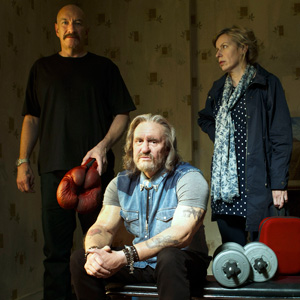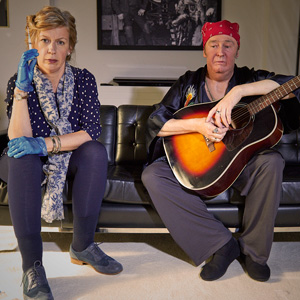Paul Whitehouse and David Cummings interview
Series writers Paul Whitehouse and David Cummings discuss the show...

What was the idea behind Nurse?
Paul: We wanted to explore the world of a Community Mental Health Nurse with warmth, compassion and humour. Mental health issues touch most people's lives but there is still something of a taboo around the subject. Mainly we wanted to create memorable characters, that viewers would enjoy, who just happen to require this service. This is a show about people, not about mental health.
What made you come up with the different characters? Some of them are from the radio comedy, and some are brand new, correct?
Paul: Some of the characters even precede the radio version! Graham Downes first came to life on our radio comedy Down The Line. For the TV version of Nurse we have expanded the characters from the radio series and created some brand-new ones. One of the more poignant ones would be Jack, the PTSD soldier.
David: It's interesting, we spent some time with a community mental health nurse and just spoke to her about her work and her patients. At the moment they are mainly PTSD soldiers.
Paul: She's at the end of a phone if we need a little bit of advice. It's a delicate area. But for people who work in community mental health and people who are touched by it, either through their own troubles or those of relatives and friends, actually there's always some humour in those situations. People find humour in the most difficult of circumstances and if you don't you're in trouble really.
Characters such as Graham and Billy, we think the fact they've got mental illnesses is almost irrelevant really. They are just people dealing with life who have slightly more severe problems than the rest of us. We like to think they will strike a chord because we are all there or thereabouts. In a way it's not really about mental health it's more about the state of the nation or the lives we lead now.
David: It's a comedy about people, relationships, families. The hook we used to hang it on is the community mental health nurse.
Paul: She's the line through it, and then me playing the different 'Service Users' or the relatives of the characters who require treatment. The nurse has a sympathetic heart but has to be quite firm with the patients as well. She takes us through it all while trying to deal with problems of her own.
David: I get the impression it's a job only for people who have a huge amount of empathy because one thing we've learnt is many patients don't really get better, they just learn to cope.
What is the transformation into the characters like?
Paul: I play a variety of characters on this show. To differentiate them from each other, visually, requires prosthetics. The prosthetics on this show are sensational, but they take a hell of a long time to apply. I can't really complain too much but it takes about two or three hours usually to get it done. The most depressing element is at six o'clock in the morning, knowing I'm going to be stuck in the prosthetics for another 12 hours or so. They're hot, heavy and itchy! But the team are fantastic and I am unrecognisable in some things.
David: I've known Paul since we were both 18 and when he was made up to be Maurice I found it actually quite weird speaking to him. It was his voice, his personality but it was coming from a different human being. I was quite spooked.
Paul: I think Esther's found it a bit like that as well. Obviously having done quite a lot of stuff on the radio looking at each other just doing a voice, you can stop doing the voice anytime but with the prosthetics you can't just lose the look. She has found it quite disconcerting. And I thought she might. She really is in a room with these people rather than just a version of me.

But, do you like doing characters, is that what you enjoy?
Paul: I love doing them because I do like playing lots of different characters; I'd get bored just playing one role through a drama or a comedy. I like the variety and I think we have always been able to, or always tried to, imbue our comedy with a huge helping of tragedy as well. So I get asked "Wouldn't you rather do some straight acting?" Well no, not really, I'd rather do some comedy without any jokes in it, which is what we do quite a lot.
Can you talk to us about the writing process and how long it took?
Paul: Yes it's quite simple, isn't it, Dave? You turn up, I'm usually at the café and then I'll come back and then we go to the café together. Then we slag off other comedians, we have a little moan about women, we slag off other TV shows, we slag off our neighbours, we slag off our families. And then I say I'm nearly done, I have to go now. That's it, that's how we write. We sort of built up via the radio, which was a really useful and enjoyable way to build up to the TV series.
David: Gertrude Stein said, "I only write half an hour a day, but what people don't understand is it takes a really long time to write for half an hour." And that's a sort of intellectual way of describing our process.
Paul: Part of it is us sitting around shooting the breeze and talking rubbish, and then you go yeah that's good, put that in. You're actually writing even though you think you're sitting around talking rubbish.
Did it feel good to get your radio comedy made into telly? Was it daunting?
Paul: No, it was always in our minds going to be a TV project. It wasn't something we did on radio and then it became a TV show. But we had the opportunity to develop the characters and do it on radio first, and I love doing radio, I really enjoy it. Since doing Down The Line, I really love to be able to do radio. It's much more spontaneous and you can just do something on a whim. Whereas TV is really slow; it's like an old oil tanker. It has a very slow turning circle, whereas radio is much more dynamic. So it was good to be able to try the characters out and we whittled the material down to cram it into 15 minutes. The advantage of TV is that we can give it a little bit more space and develop Esther's character as the nurse more.
Liz's own story is that she's coping with some of the problems of middle-age. It's like you have to be a superhero where you're looking after your young children and your aged parents and you feel like you're overwhelmed with responsibilities in life. So I hope we haven't lumbered her with too many of those, and where we have, we have tried to do it in our usual sort of tragi-comic way.

Is it tricky playing eight characters in one show?
Paul: I don't know really - I'm sort of used to it. The only thing I'd say is that there are similarities between the characters. They have similar problems and because it's nominally based in London - it's not really but we can't do loads of regional accents because it would be like 'where's her jurisdiction?' So we are slightly constrained by a little sense of reality. I've done some of these characters before or versions of them, so I'm just giving them a different perspective. Graham Downes I've done before. Rockin' Ray we do as a kind of shorthand for any old rocker really. He is a man out of time, language courtesy of The Troggs Tapes. We use that language, not just Dave and me but all our circle of friends, we lapse into that all the time. But we developed the character into a slightly lumpen rocker with a higher opinion of his achievements than they merit. Where do they go, those people, when that career is over? Some of them are quite wealthy but they've got no life, their heyday is 30 years ago and they just have to regurgitate their two hits over and over. So they take up something like martial arts to fill the void. Reg Presley got a tidal wave of money from Wet Wet Wet's cover of his song Love Is All Around and spent it all on UFO hunting. I don't think he found any.
Is Nurse very different from playing different characters in a sketch show like The Fast Show?
Paul: It is, in that the content is much more intense, I'm always relating to Liz the nurse. So it's not like I can come on and do a monologue to the camera or a catchphrase and get off. There is an intensity to the scene. So it is very different to doing The Fast Show, not least because there were six of us and I could have a lie down while the others were filming.
Is it good working with Esther again since the radio comedy?
Paul: Esther is a friend of mine. We haven't known each other many years, but it seems like we have. I personally have got a lot of time for her. It's lovely having her on the other side of the set. She's a very funny and warm person and it was nice to use somebody that hasn't done a lot of TV recently. It was lovely to be able to write for someone people aren't tired of. Like me; "oh it's not him again."

